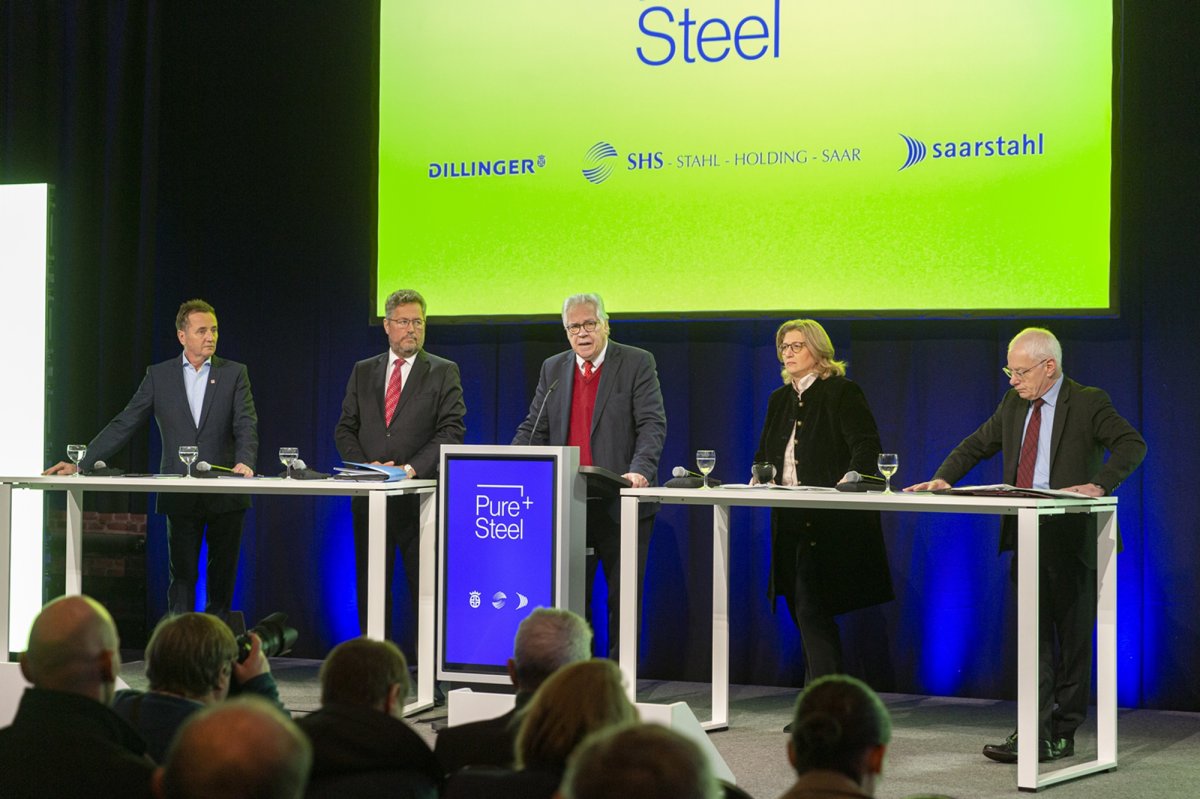The Supervisory Boards of SHS – Stahl-Holding-Saar, Saarstahl AG and Aktien-Gesellschaft der Dillinger Hüttenwerke (Dillinger), the Board of Trustees of Montan-Stiftung-Saar, and the Board of Management of SHS – Stahl-Holding-Saar have jointly resolved to invest EUR 3.5 billion – subject to the approval of public funds – to transform the steel industry in the Saarland and enable the production of green steel. The decision by the Supervisory Boards enables the decarbonisation of Saarland’s steel industry. Starting as early as 2027, up to 3.5 million tons of low-carbon steel will be produced annually in Saarland and carbon emissions will be cut by 4.9 million tons.
This decision bolsters the pioneering role of Saarland’s steel industry in switching production to “green” steel. It is the declared goal of SHS to become the European model for industrial carbon reduction. For this project, Montan-Stiftung-Saar trust and SHS – Stahl-Holding-Saar are relying on public funding, as the planned investment of EUR 3.5 billion poses significant challenges for Saarland’s steel industry.
The necessary documents have been submitted, but the approval process has not yet been completed. With their decision to grant the official signal to proceed, the Supervisory Boards have now made it possible to nonetheless achieve the EU climate targets for 2030 (carbon emissions at least 55 per cent below 1990 levels).
Over the next few years leading up to 2027, in addition to the established blast furnace route, the new production line with an electric arc furnace (EAF) will be built at the Völklingen site and an EAF and direct reduced iron (DRI) plant for the production of sponge iron will be built at the Dillinger plant site.
Transformation branding has also been developed to visually represent the transformation: “Pure Steel +”. The message of “Pure Steel +” is that Saarland’s steel industry will retain its long-established global product quality, ability to innovate, and culture, even in the transformation. The “+” refers to the carbon neutrality of the products.
The availability of green hydrogen at competitive prices is a basic precondition for this ambitious project to succeed, along with prompt funding commitments from Berlin and Brussels. Local production of hydrogen will therefore be established as a first step together with the local energy suppliers, before connecting to the European hydrogen network to enable the use of hydrogen to be increased to approx. 80 per cent.
The Saarland steel industry is thus laying the foundation for a new hydrogen-based value chain in the Saarland, in addition to decarbonizing its own production. In this way, SHS – Stahl-Holding-Saar is supporting Saarland on its path to becoming a model region for transformation.
Reinhard Störmer, Chairman of the Board of Trustees of Montan-Stiftung-Saar and Chairman of the Supervisory Boards of SHS, Saarstahl and Dillinger: “Saarland’s steel industry is leading the way with this decision and is taking on a pioneering role in carbon reduction. With this concept, our steel companies will significantly advance the transition of the Saar into a green economic region. The Montan-Stiftung-Saar trust is thus once again fulfilling its mission to safeguard the steel industry and its jobs long term.”
Jörg Köhlinger, Director of the IG Metall Central Region and Deputy Chairman of the Supervisory Boards of SHS, Saarstahl and Dillinger: “Today’s resolution is an important step on the path to green steel production in Saarland. Steel companies are an important pillar of the economy and a guarantor of training and jobs in the region. The transformation, which also takes into account the interests of employees, offers great opportunities for value creation in line with social and environmental concerns, with sustainable employment prospects in Saarland. It’s based on employee codetermination as equals in the mining and metallurgy industry. However, an employment-focused transformation also needs political support if the project is to succeed. Now we need the federal government and the EU to quickly create the optimal framework conditions for this.”
Dr. Karl-Ulrich Köhler, Chairman of the Board of Management of SHS and CEO of Dillinger and Saarstahl: “The decision of the Supervisory Boards demonstrates that we have developed the right strategies and measures to ensure the future viability of our companies. Dillinger and Saarstahl customers are also highly interested in green steel. The task now is to implement this within an ambitious timeframe. We are ready and have strong support at our side from the Saarland state government. Now it’s up to the political decision-makers in Brussels and Berlin to implement functioning framework conditions for the transformation to green steel in a timely manner and to approve the applications for the necessary funding.”
Anke Rehlinger, Minister President of Saarland: “Restructuring the steel industry is a milestone for the protection of jobs and the climate. We are embarking on what is likely the largest investment in the history of Saarland and one of the largest transformation projects in Europe. This technological transformation will be an enormous joint effort on the part of businesses, the federal government and the state.”
Jürgen Barke, Minister for Economic Affairs, Innovation, Digital and Energy: “This is one of the most important decisions for the future of our state and we stand ready to support the project with instrumental financial and administrative assistance to the greatest extent possible. Our mission as a state is to achieve the best possible conditions for green steel to be produced in the Saar region, and our transformation fund is what will make this possible. Through it, we as a state will be able to contribute our part in bold corporate decisions like these. Guard rails are being established here for all of Saarland as a business location, and value creation and jobs are being safeguarded. Our steel from Saarland has a future – and the companies and employees of the Saarland steel industry have the state and state government on their side.”

